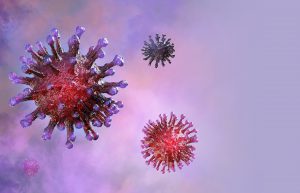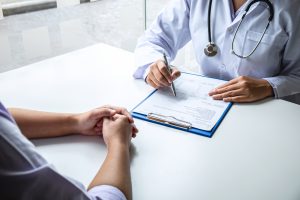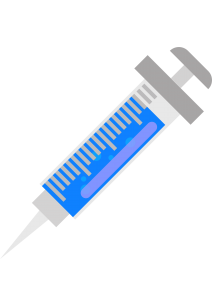The information provided in this article was last updated on 26th June 2020. For the most up to date advice, please visit the NHS website.
- Posted: 12 March 2020
- Tagged: Prostate Cancer
Coronavirus and Prostate Cancer: The Facts
The recent media coverage surrounding the coronavirus COVID-19 can be incredibly alarming, especially for those living with underlying health conditions such as cancer. Here at PCR, we want to explore what COVID-19 means for those affected by prostate cancer and provide our readers with the information they need to stay safe.
This page includes information on:
- What is Coronavirus?
- What are the symptoms of COVID-19?
- Will COVID-19 affect prostate cancer treatment?
- If I have prostate cancer, am I more likely to get or become seriously ill with COVID-19?
- How can I protect myself?
- What if I think I have contracted COVID-19?
- Is there a vaccine for COVID-19?
- Other useful organisations
What is Coronavirus? What is COVID-19?
Coronaviruses (CoV) are a large family of viruses that cause illness ranging from the common cold to more severe diseases such as Middle East Respiratory Syndrome (MERS-CoV) and Severe Acute Respiratory Syndrome (SARS-CoV).
COVID-19 is a new strain of coronavirus that has not been previously identified in humans. At present, the term ‘coronavirus’ is usually intended to refer to COVID-19.
People can catch COVID-19 from others who have the virus. The disease can spread from person to person through small droplets from the nose or mouth which are spread when a person with COVID-19 coughs or exhales. These droplets can land in the mouths or noses of people who are nearby or possibly be inhaled into the lungs.
What are the symptoms of COVID-19?
The following symptoms may take up to 2-14 days after exposure to appear.
- Fever
- Cough
- Shortness of breath
- Tiredness
- Loss or change to your sense of smell or taste
You may not know you have symptoms of COVID-19 because they are similar to a cold or flu. The symptoms are usually mild and start gradually.


Will COVID-19 affect prostate cancer treatment?
The NHS have taken precautions to ensure all urgent and essential cancer treatment is able to continue.
However, you and your doctor may decide to delay or change your treatment plan. This is because some treatments may put you at a higher risk of contracting COVID-19. Also, attending appointments at GP surgeries or hospitals could expose you to the virus. Your doctor should discuss any changes to ensure you understand why and know all your available options.
There may be other changes to the way you receive your care.
- Appointments may take place over the phone
- You may have to attend a different hospital for surgery
- Private hospitals may be used by the NHS for cancer treatments
- ‘Virus-free’ cancer centres are being set up to enable cancer treatments to continue
If I have prostate cancer, am I more likely to get or become seriously ill with COVID-19?
There are two levels of higher risk: moderate-risk (vulnerable) and high-risk (extremely vulnerable). It’s important to know that certain prostate cancer treatments can affect the immune system’s ability to fight infection. To view the full list of currently known risk factors, please visit the NHS website.
People classed as moderate-risk include those who:
- Are 70 or older
- Have serious medical conditions including cancer
People classed as high-risk include those who:
- Are on or have had chemotherapy within the past three months
- Are on or have had immunotherapy within the past three months
- Have advanced prostate cancer, which has spread to the lungs
- Are taking medicines that affect the immune system
If you are unsure whether your treatment affects your immunity, it is important to check with your care provider or call the NHS on 111.
For those who have undergone treatment in the past, most people’s immune system will make a full recovery but this can vary depending on the type of cancer and the treatment received. Again, it is important to check with your doctor or call 111 if you are unsure.
If you are in the high risk group you should have received a letter from the NHS. If you believe you are in this group, but have not received a letter, please contact your GP or health care team.
How can I protect myself?
Those in the high-risk group are advised to practice ‘shielding’ by following these steps:
- Stay at home as much as possible- do not leave to buy food or collect medicine
- Do not have visitors in your home unless they are providing essential care
- Wash hands often with soap and water for at least 20 seconds
- Clean surfaces regularly e.g. door handles, kettles and phones
If you need help accessing food and medication whilst shielding, register for support here.
The specific shielding guidance differs depending on whether you live in England, Scotland, Wales or Northern Ireland. Please ensure that you check the guidance where you live.
Those in the moderate-risk group are still advised to follow government social distancing guidelines to ensure they minimise their risk of contracting COVID-19.
It’s also important to look after your mental wellbeing whilst self-isolating
- Stay connected with family and friends via telephone, video calls and social media
- Establish a routine
- Spend time doing things you enjoy
- Limit time spent watching or reading the news
The charity, Mind, also has lots of useful information about coping with the stress and worry around coronavirus.
Is there a vaccine for COVID-19?
There is currently no vaccine available for COVID-19 as it is still an incredibly new virus. Vaccines have been developed by researchers but these still need to undergo important safety tests.
Although it will not prevent coronavirus, it could be helpful for people to receive the flu vaccine. This will reduce the number of people who become infected with the flu, therefore enabling the NHS to concentrate on treating those with coronavirus. Also, the flu and coronavirus share many symptoms so reducing the number of people with the flu can make it easier to diagnose coronavirus. It is safe for those undergoing cancer treatment to have the flu vaccine as it doesn’t contain live flu virus. It is offered free of charge on the NHS to people who are at risk, including those over the age of 65 and those on certain medical treatments.

WHAT IF I THINK I HAVE CONTRACTED COVID-19?
If you believe you may have contracted coronavirus, call the NHS on 111. Ensure that you tell them about your prostate cancer diagnosis and any treatment that you are having/have had.